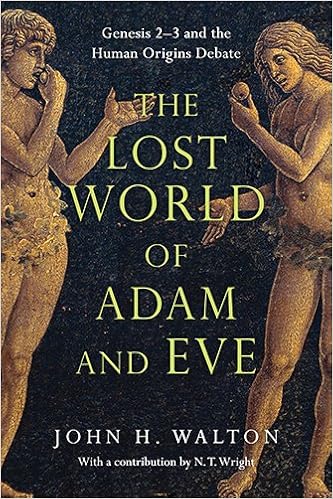
Human origins have been a matter of debate for many Christians in recent years. God as the author of life is a firm truth among believers, yet the divine method used to create humanity is where controversy may be found. Scientific scholarship posits that mankind rose from a lengthy process of gradual change commonly called evolution. Such an idea seems to deny the historic position of mankind's creation as fully formed human beings. This apparent contradiction has led to numerous debates and a great amount of dialogue. The rhetoric on both sides of the issue has become heated at times with uncharitable words bantered back and forth. Now clearly the question of human origins carries with it theological issues, but is it possible for Bible-believing Christians to hold differing positions while still holding to the truth of scripture and the message of the gospel? Author and scholar John H. Walton seeks to answer that question in his work, The Lost World of Adam and Eve.
While affirming the veracity of scripture, Dr. Walton posits that it may be possible for modern scientific consensus to be compatible with the origin account we find in the book of Genesis. Calling on Christians to look at the text through the eyes of ancient believers, the author seeks to show the worldview that would have been prevalent in the original reading of the text. Through an analysis of historical records and writings, it is shown that material origins seems to be a more modern concept. In millennia past, people focused on creating order from disorder and function from non-function. Building upon this premise, Dr. Walton suggests that Genesis does not speak to the material origins of people but rather to their functional order in God's plan to bring an ordered world out of non-order. He posits that disorder arose from Adam and Eve's sin. Serving in a priestly role in the sacred space of the garden, they disrupted God's plan and cut off humanity from life. Jesus reversed this fall and has set right God's plan to bring about a world with no more disorder or non-order. Thus death was not originally a disordered position but a non-ordered position that will only be overcome at the end of time. In this way, the author claims that although Adam and Eve were real people, they were not the first people and that death existed before the fall. The conclusion of the book seeks to paint a broad brush for evangelicals to embrace. Whether holding to evolution or a historic creation position, Dr. Walton says that both views should be viewed as acceptable and good.
If the summary sounds a little convoluted, it is an accurate reflection of the content of the book. Much like a child stacking blocks one upon the other, the whole structure becomes less stable the higher it rises. Dr. Walton works from an array of propositions that have to stack carefully on top of one another to make sense. The problem is that the weight of the propositions cannot hold together. One must accept each logical leap for the whole to make sense. If one premise falters then the whole structure comes down. As the chapters build one upon the other, some propositions are weaker than others and the whole cannot support the cracks found in the foundational ideas. One must assume that translators of the Hebrew and Greek have been wrong for thousands of years in their understanding of basic words. One must assume that clear scriptural statements mean something different than their historic interpretation, and that the truth is only unlocked in light of modern evolutionary theories. In addition, the category of non-order seems to be contrived as a way to explain away death so that it could exist before the fall of mankind into sin. Although well written and laudably defended, there is simply not much content to make a case for the premise of the book. It relies too much on conjecture and not enough on critical scholarship.
No comments:
Post a Comment